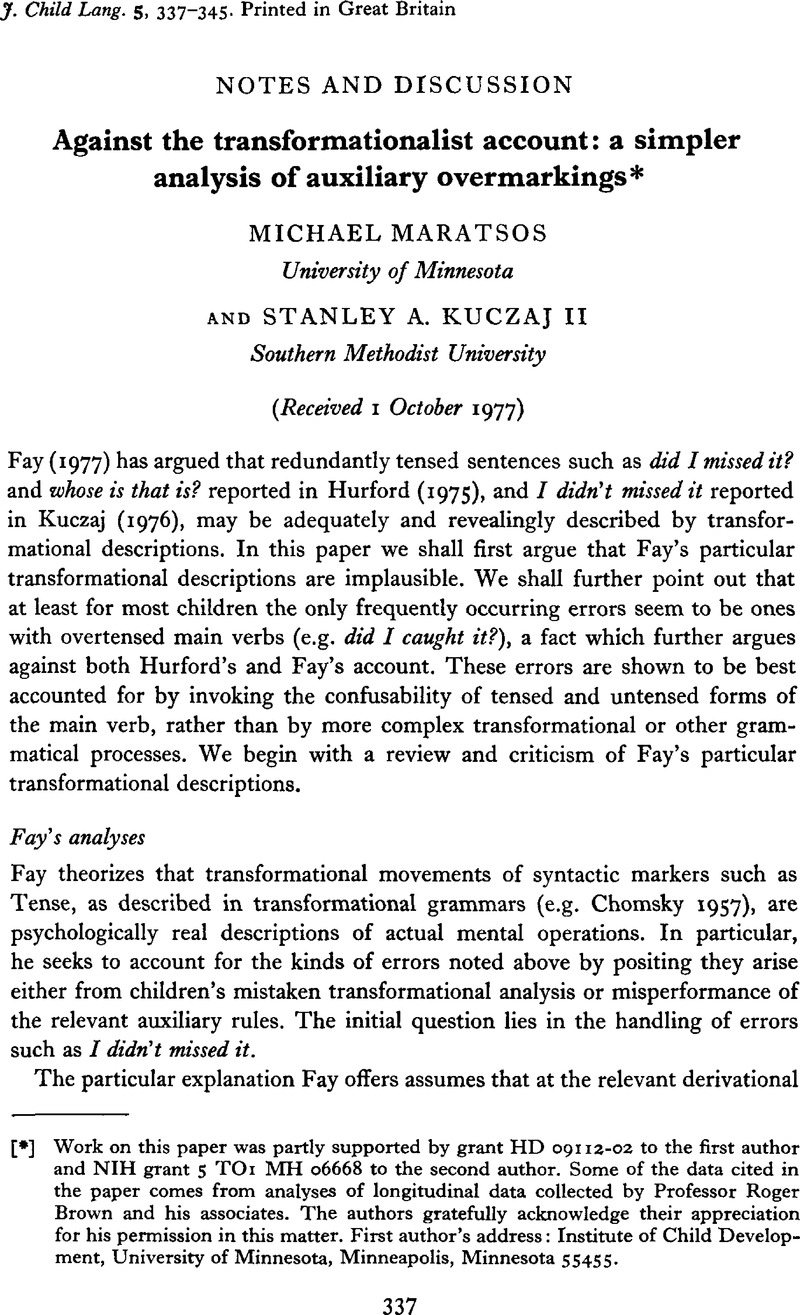Crossref Citations
This article has been cited by the following publications. This list is generated based on data provided by Crossref.
Goodluck, Helen
and
Solan, Lawrence
1979.
A reevaluation of the basic operations hypothesis.
Cognition,
Vol. 7,
Issue. 1,
p.
85.
Hamburger, Henry
1980.
A deletion ahead of its time.
Cognition,
Vol. 8,
Issue. 4,
p.
389.
Maratsos, Michael
1985.
LANGUAGE ACQUISITION AND LINGUISTIC THEORY, Susan L. Tavakolian, ed. Cambridge, Mass.: MIT Press, 1981. Pp. 233..
Studies in Second Language Acquisition,
Vol. 7,
Issue. 1,
p.
109.
Kuczaj, Stan A.
1986.
General developmental patterns and individual differences in the acquisition of copula and auxiliary be forms.
First Language,
Vol. 6,
Issue. 17,
p.
111.
Nakayama, Mineharu
1987.
Performance factors in subject-auxiliary inversion by children.
Journal of Child Language,
Vol. 14,
Issue. 1,
p.
113.
Pinker, Steven
and
Prince, Alan
1988.
On language and connectionism: Analysis of a parallel distributed processing model of language acquisition.
Cognition,
Vol. 28,
Issue. 1-2,
p.
73.
Chen, Jenn-Yeu
and
Baars, Bernard J.
1992.
Experimental Slips and Human Error.
p.
217.
Stemberger, Joseph Paul
2002.
Overtensing and the effect of regularity.
Cognitive Science,
Vol. 26,
Issue. 6,
p.
737.
Hiramatsu, Kazuko
2003.
Children's Judgments of Negative Questions.
Language Acquisition,
Vol. 11,
Issue. 2,
p.
99.
Rowland, Caroline F.
Pine, Julian M.
Lieven, Elena V. M.
and
Theakston, Anna L.
2005.
The Incidence of Error in Young Children'sWh-Questions.
Journal of Speech, Language, and Hearing Research,
Vol. 48,
Issue. 2,
p.
384.
Stemberger, Joseph Paul
2007.
Children’s overtensing errors: Phonological and lexical effects on syntax.
Journal of Memory and Language,
Vol. 57,
Issue. 1,
p.
49.
Polinsky, Maria
2007.
Reaching the end point and stopping midway: different scenarios in the acquisition of Russian.
Russian Linguistics,
Vol. 31,
Issue. 2,
p.
157.
Ambridge, Ben
Rowland, Caroline F.
and
Pine, Julian M.
2008.
Is Structure Dependence an Innate Constraint? New Experimental Evidence From Children's Complex‐Question Production.
Cognitive Science,
Vol. 32,
Issue. 1,
p.
222.
Ambridge, Ben
and
Rowland, Caroline F.
2009.
Predicting children's errors with negative questions: Testing a schema-combination account.
Cognitive Linguistics,
Vol. 20,
Issue. 2,
Rowland, Caroline F.
and
Theakston, Anna L.
2009.
The Acquisition of Auxiliary Syntax: A Longitudinal Elicitation Study. Part 2: The Modals and Auxiliary DO.
Journal of Speech, Language, and Hearing Research,
Vol. 52,
Issue. 6,
p.
1471.
Schütze, Carson T.
2010.
The Status of NonagreeingDon'tand Theories of Root Infinitives.
Language Acquisition,
Vol. 17,
Issue. 4,
p.
235.
Miller, Karen
2012.
Not All Children Agree: Acquisition of Agreement When the Input Is Variable.
Language Learning and Development,
Vol. 8,
Issue. 3,
p.
255.
2020.
Pedagogical grammar as the framework of tefl research. Part 8. Foreign language syntax acquisition: wh-questions.
Teaching languages at higher institutions,
Du, Yiran
2023.
A corpus-based study to evaluate the generativist explanation of children’s error patterns in questions.
Journal of Language Teaching,
Vol. 3,
Issue. 3,
p.
26.


